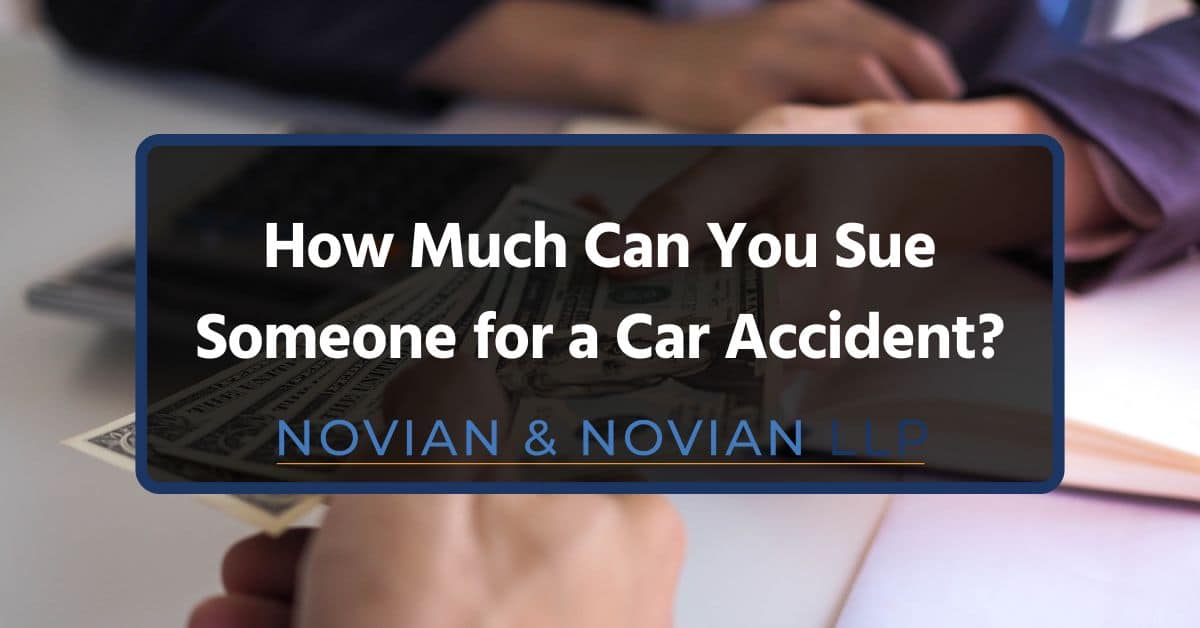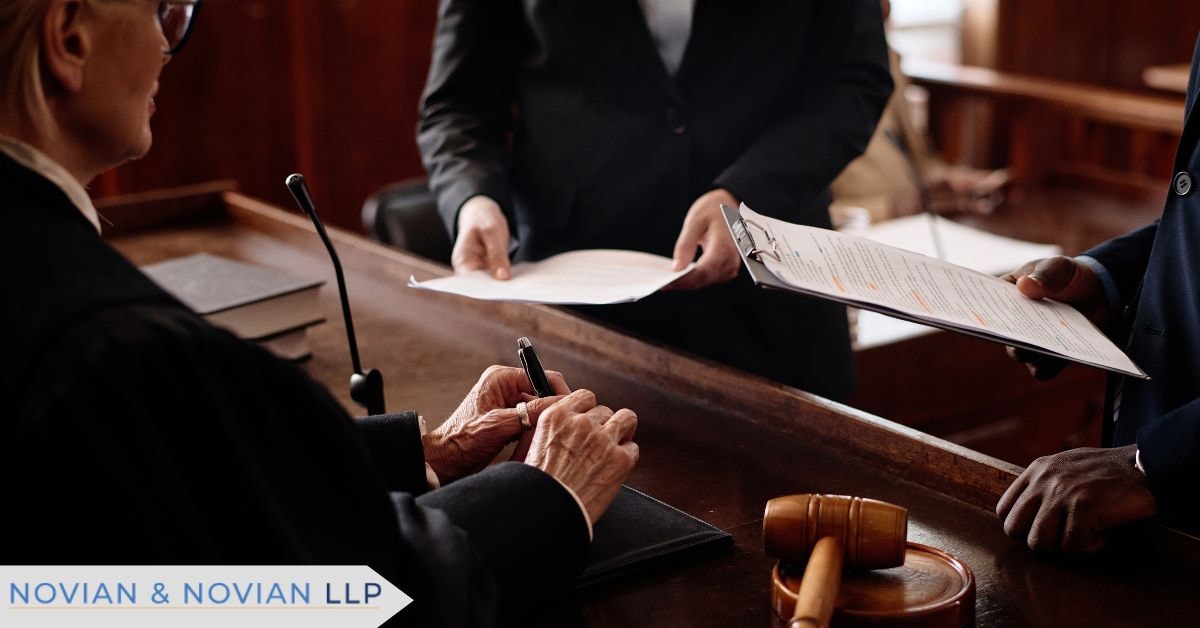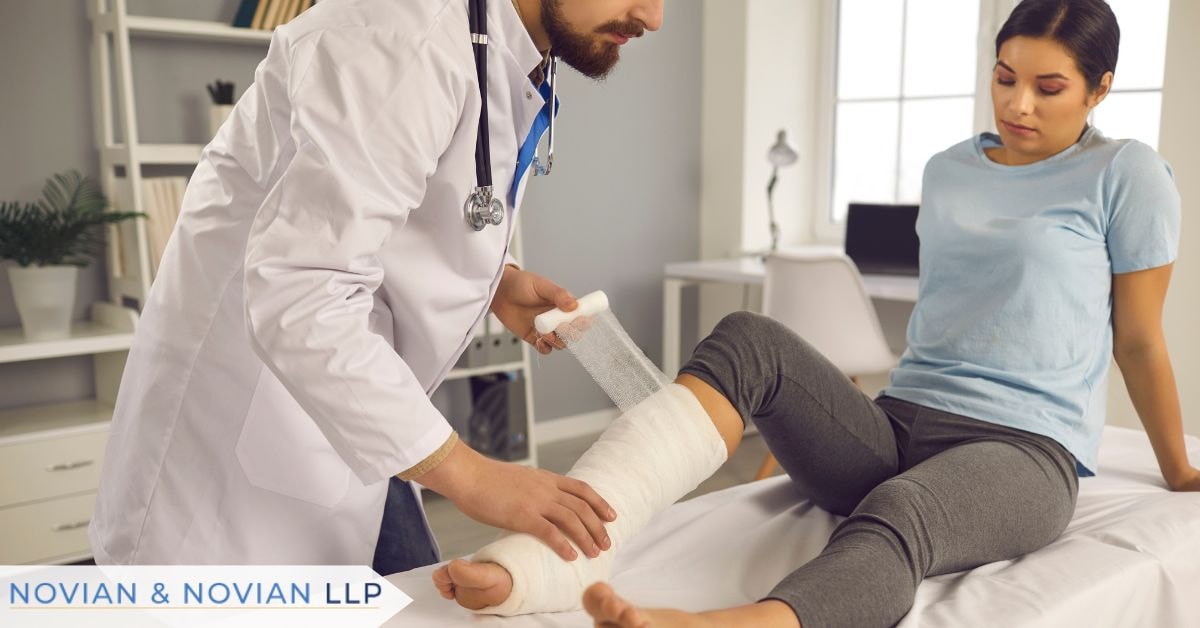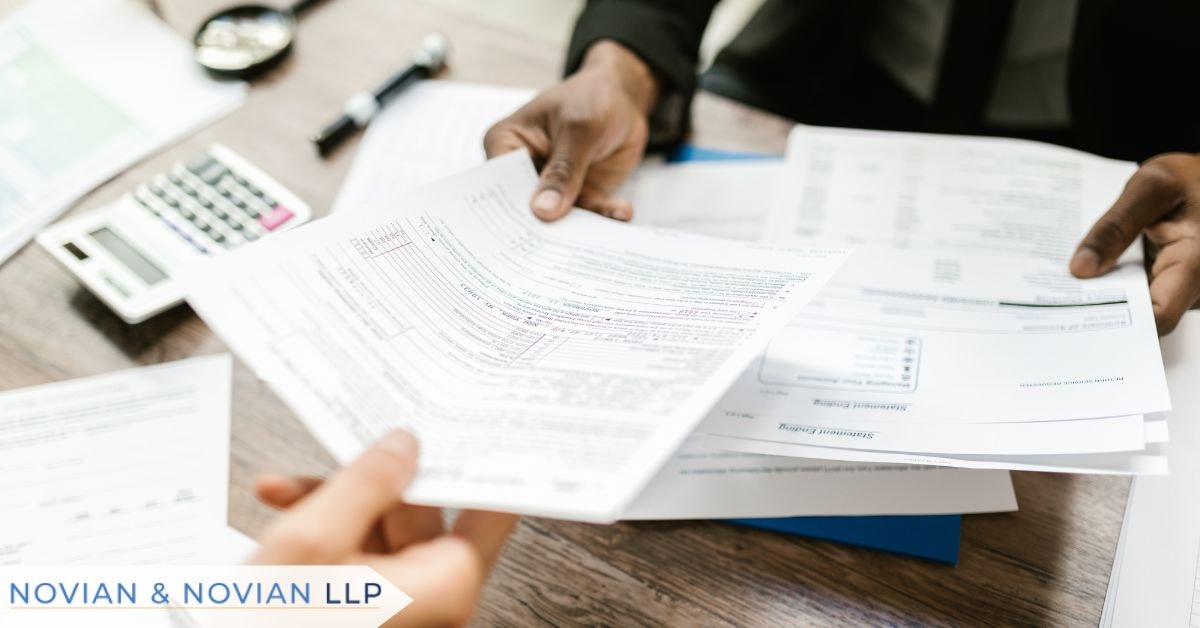
By | Mar 20, 2025 | Catastrophic Injury
A car accident can lead to serious injuries, financial losses, and emotional distress, often prompting victims to seek legal action. When pursuing a car accident lawsuit, understanding potential limits on compensation and the different types of damages you may be entitled to can assist you through the judicial process and help you know what to reasonably expect out of your claim.
The actual payout for a car accident lawsuit can range widely. Minor injuries may lead to settlements in the thousands, while severe injuries or wrongful death cases can result in compensation reaching hundreds of thousands or even millions of dollars.
If you’ve been injured in a car accident and are unsure how much compensation you may be entitled to, Novian & Novian can help. Our experienced personal injury attorneys in California will assess your case, guide you through the legal process, and fight for the maximum compensation you deserve. Contact us today for a free consultation and let us help you get the justice you need.
This post will cover the settlement amounts and compensations for car accident lawsuits. It will also share tips on how to get the most compensation after a car accident.
What Are Car Accident Lawsuits and How Do They Work?
A car accident lawsuit is a type of personal injury claim that allows victims to seek compensation for their losses when another party is at fault. These claims help recover costs related to medical treatment, lost wages, property damage, and emotional distress caused by the accident. The goal of a lawsuit is to hold the negligent party accountable and secure financial relief for the victim’s suffering.
Many people assume that filing an insurance claim is the same as suing for damages, but they are two different processes. An insurance claim is a request for compensation from your own or the at-fault driver’s insurance company, often leading to a settlement based on policy limits. However, if the settlement offer is too low or liability is disputed, filing a lawsuit may be necessary to pursue full compensation through the court system.
Typically, liability in a car accident case is determined by negligence, which means proving that another driver acted carelessly or recklessly, leading to the crash. You can show proof by providing evidence such as police reports, witness statements, and traffic camera footage.
How Much Can You Sue Someone for a Car Accident
When it comes to car accident settlements, the amount you can sue for depends on the severity of your injuries, financial losses, and the circumstances of the crash. Settlements vary widely, ranging from a few thousand dollars for minor injuries to over a million dollars for severe cases or wrongful death.
Minor injury cases typically fall between $5,000 and $25,000, covering medical expenses, lost wages, and pain and suffering. For example, one of our clients, Tessa, was involved in a rear-end accident and suffered mild neck and back sprains. We were able to help her secure $12,000 in settlements.
Moderate injury cases are accidents that may involve fractures, significant medical treatment, or long-term recovery. These can result in settlements between $25,000 and $100,000. This was the case for another of our clients, Joe, who suffered a fractured wrist and concussion after a side-impact collision. His final settlement amounted to $85,000.
In severe injury cases or wrongful death claims, compensation can exceed $100,000 and even reach $1,000,000+, especially when lifelong medical care, permanent disability, or loss of life is involved. Two years ago, we filed a lawsuit for Tom, one of our clients, a cyclist who suffered a spinal injury after being struck by a negligent driver. We represented him in court, and the jury awarded him $1.2 million.
Types of Damages You Can Sue for
When filing a car accident lawsuit, victims may be entitled to various forms of compensation depending on the severity of the accident, the impact on their lives, and the at-fault driver’s negligence. Compensation in a car accident case is generally categorized into economic damages, non-economic damages, and, in some cases, punitive damages.
Economic Damages (Compensatory Damages)
Economic damages refer to the measurable financial losses incurred due to a car accident. These damages include medical expenses, which cover immediate medical treatment, ongoing medical costs, and future medical bills related to severe injuries. Victims often require extensive medical treatment, such as physical therapy, surgeries, and even mental health services for emotional trauma.
Car accident lawsuits also account for lost wages and reduced earning capacity. If a car crash prevents the injured party from working temporarily or permanently, they can sue for lost income.
Additionally, property damage compensation ensures that victims receive the necessary funds to repair or replace their vehicles. Insurance companies and law firms typically assess vehicle repair estimates and the fair market value of a totaled car when determining compensation.
Non-Economic Damages
Non-economic damages compensate for the pain and suffering caused by the accident, which does not have a direct financial cost but significantly impacts the victim’s quality of life. Emotional distress is another factor, as car accident victims may develop anxiety, depression, or even post-traumatic stress disorder (PTSD) due to the traumatic experience.
In severe cases, victims may suffer a loss of enjoyment of life, where their injuries prevent them from engaging in activities they once loved. There is also loss of consortium, which refers to the impact of the accident on personal relationships, particularly when injuries prevent the injured party from maintaining a normal relationship with their spouse or family. Since insurance policies may not always cover non-economic damages, hiring a personal injury attorney is essential for ensuring a fair settlement.
Punitive Damages
Punitive damages are awarded in cases where the at-fault driver’s actions were particularly reckless or intentional. Unlike economic and non-economic damages, which aim to compensate the injured party, punitive damages serve as a punishment for the responsible party and deter similar behavior in the future.
Examples of reckless or intentional behavior include drunk driving, excessive speeding, or fleeing the scene of an accident. However, punitive damages are subject to legal limitations in some states, and certain jurisdictions impose caps on the amount that can be awarded. Personal injury lawyers can help determine whether punitive damages apply to a case and navigate the legal process to recover compensation.
How Much Can I Sue for in a Car Accident?
The amount you can sue for in a car accident depends on several factors, including the severity of your injuries, available insurance coverage, state laws, the strength of your evidence, and the defendant’s ability to pay. Car accident victims often suffer from medical expenses, lost wages, and emotional distress, all of which play a role in determining fair compensation.
The extent of injuries sustained in a car crash significantly influences how much someone can sue for. Minor injuries, such as whiplash or bruises, typically result in lower settlements, while severe injuries like broken bones, spinal cord damage, or traumatic brain injuries can lead to much higher payouts. In cases where a victim suffers long-term or permanent disabilities, the compensation amount increases due to ongoing medical treatment, physical therapy, and lost earning capacity.
Insurance policies also play a major role in determining how much compensation a car accident victim can recover. The at-fault driver’s liability insurance coverage dictates the maximum payout available, but if their insurance provider denies a claim or their coverage limits are too low, victims may need to seek compensation through other means. Uninsured motorist coverage from your own insurance company can help if the at-fault driver lacks sufficient insurance. Additionally, personal injury protection (PIP) or medical payment coverage can help cover immediate medical expenses, regardless of fault.
Car accident claims vary widely depending on state laws. Some states follow comparative negligence rules, which reduce compensation based on the victim’s percentage of fault, while others adhere to no-fault laws that require injured parties to first seek compensation from their own insurance provider.
States also impose minimum coverage amounts that drivers must carry, affecting how much can be recovered in an insurance claim. A personal injury lawsuit may be necessary if the insurance settlement is insufficient to cover medical costs, lost income, and other financial losses.
Furthermore, strong evidence is important in proving negligence and securing fair compensation in an auto accident lawsuit. Police reports, medical records, witness statements, and photographs of the accident scene provide clear proof of liability and the extent of injuries. Without sufficient evidence, an insurance company may deny a claim, leaving the injured party struggling to recover compensation. Personal injury lawyers can help gather and present this evidence effectively during legal proceedings.
Even if a lawsuit results in a high compensation award, the at-fault driver’s financial situation can impact the actual payout. If the defendant lacks assets or insurance coverage, collecting the full amount may be difficult. In such cases, a law firm may explore alternative options, such as wage garnishment or structured settlements, to help car accident victims receive what they are owed.
What if the At-Fault Driver Is Uninsured?
Not all drivers carry car insurance, and if the responsible party is uninsured, recovering damages can be more challenging. However, there are still options available for accident victims.
If your own insurance policy includes uninsured motorist coverage, it can cover medical expenses, lost wages, and other damages. On the other hand, you can still sue the at-fault driver personally, although collecting compensation may be difficult if they lack financial resources.
Some states provide additional protections for victims of uninsured drivers, including compensation funds or legal protections. If you have collision or comprehensive insurance, it may help cover vehicle repairs and certain medical bills.
How to Get the Most Compensation After an Auto Accident
Maximizing compensation after a car accident requires taking the right steps immediately after the crash and throughout the claims process. Insurance companies often attempt to minimize payouts, so accident victims must protect their rights by gathering evidence, seeking medical treatment, and consulting a personal injury lawyer.
After an auto accident, you must seek immediate medical attention, even if injuries seem minor. Some injuries, such as whiplash or internal trauma, may not show symptoms immediately but could worsen over time. Seeking prompt medical care not only ensures your health and safety but also creates official medical records that can serve as evidence in a car accident claim. Without proper documentation, insurance companies may argue that injuries were unrelated to the crash, reducing the compensation you can recover.
Next, report the accident to your insurance company. Even if another driver was at fault, your own insurance coverage such as uninsured motorist coverage may play a role in your compensation.
It is also important that you do not settle too quickly. Insurance companies often pressure accident victims to accept quick settlements, but early offers rarely account for long-term medical costs, lost wages, and emotional suffering. Once a settlement is accepted, victims typically cannot seek additional compensation, even if future medical expenses arise. Consulting a car accident attorney before accepting any offer can help ensure that all damages are considered before finalizing a settlement.
Furthermore, working with an experienced personal injury attorney significantly increases the chances of securing fair compensation. A lawyer can negotiate with the insurance company, gather evidence, and calculate the full extent of damages, including economic and non-economic losses.
Additionally, don’t sign anything without review. Insurance companies may ask accident victims to sign documents, including medical authorizations and settlement agreements. However, signing anything without legal review could jeopardize your case. Some agreements waive the right to seek further compensation, even if new injuries or damages emerge later. Always consult a personal injury lawyer before signing any insurance documents to protect your claim.
Can You Sue If You Were Partially at Fault?
Being partially at fault in a car accident does not necessarily prevent you from recovering compensation. Many states follow comparative negligence laws, which allow accident victims to sue for damages even if they share some responsibility for the crash with the at-fault driver. However, the percentage of fault assigned to each party can impact the final compensation amount.
Comparative negligence is a legal principle that determines compensation based on each party’s level of fault in an accident. Instead of barring recovery completely, as some older laws did, comparative negligence allows injured parties to recover damages even if they were partly responsible for the crash. This means that even if a driver was speeding but another driver ran a red light, they may still be able to sue for a portion of the damages. For example, if a car accident victim is found 20% at fault and their total damages are $100,000, they would still be eligible to receive $80,000.
State laws vary when it comes to handling car accident cases involving shared fault. For pure comparative negligence states, victims can recover damages even if they are 99% at fault, but their compensation is reduced accordingly. However, in comparative negligence states, victims can recover damages only if they are less than 50% or 51% at fault. Then, in contributory negligence states, if the victim is even 1% at fault, they are barred from recovering compensation.
Is It Worth Suing After a Car Accident?
After a car accident, deciding whether to file a lawsuit depends on several factors, including the severity of injuries, property damage, and whether the insurance company offers fair compensation. Some car accident victims may resolve their claims through an insurance settlement, while others may need to pursue a personal injury lawsuit to recover compensation for medical expenses, lost wages, and non-economic damages.
One of the first things to consider is the cost versus the benefit of suing. Lawsuits can be time-consuming and may take months or even years to resolve. However, personal injury lawyers often work on a contingency fee basis, meaning they only get paid if you win your case. This can make it more accessible for injured parties to seek compensation without worrying about upfront legal fees.
The severity of injuries and property damage also plays a big role. If an accident resulted in minor injuries with minimal medical bills, negotiating with the insurance company may be sufficient. However, if the accident caused severe injuries such as traumatic brain injuries, broken bones, or permanent disabilities, suing might be the only way to secure fair compensation.
Insurance limitations are another factor to consider. If the at-fault driver only carries the minimum coverage amounts required by state law, their insurance may not be enough to cover all damages. In cases where an insurance provider denies a claim or offers an unfair settlement, filing a car accident lawsuit may be the best option to recover compensation.
Seeking legal advice is always recommended. An experienced car accident attorney can evaluate the case, negotiate with the insurance company, and take legal action if necessary.
Do You Always Need a Lawyer to Sue for a Car Accident?
In some cases, car accident victims may be able to handle their claims without hiring a lawyer. If the accident was minor and liability is clear, the insurance company may offer a fair settlement that covers medical expenses, lost wages, and property damage. In such situations, hiring a personal injury attorney may not be necessary. However, in more complex cases, having legal representation can make a significant difference in the outcome.
Hiring a lawyer is worth it when the insurance provider refuses to offer fair compensation or when the accident results in severe injuries requiring long-term medical treatment. A personal injury lawyer can help gather crucial evidence such as medical records, police reports, and witness statements to strengthen the case. Additionally, if the at-fault driver was uninsured or underinsured, a lawyer can help explore other options, such as filing a claim through the victim’s own uninsured motorist coverage. In cases involving substantial economic damages, loss of future earnings, or disputes over liability, having an experienced law firm handle the legal process can ensure that the injured party receives fair compensation.
Why You Need the Best Car Accident Attorney After a Crash
After an auto accident, victims may face significant economic damages, including medical expenses, lost income, and property damage. In more severe cases, such as those involving traumatic brain injuries or permanent disabilities, the long-term financial impact can be overwhelming. A skilled personal injury attorney understands how to assess the full extent of damages and fight for fair compensation.
Additionally, proving fault in a car accident case can be challenging, especially when multiple parties are involved or when the other driver denies responsibility. An attorney can gather crucial evidence to establish liability, ensuring that the responsible party is held accountable. If necessary, they can also take the case to court to pursue maximum compensation.
If you or a loved one has been injured in a car accident, it is best to seek legal representation as soon as possible. Our experienced attorneys at Novian & Novian specialize in handling car accident cases and catastrophic injuries. We offer personalized legal guidance and representation to help accident victims recover fair compensation. Schedule a free consultation with us today!
Contact Us
Have questions about this post? Novian & Novian is a full service law firm in Los Angeles with clients that span the country. Contact us today for a free consultation.
Contact Us
Have questions about this post? Novian & Novian is a full service law firm in Los Angeles with clients that span the country. Contact us today for a free consultation.





